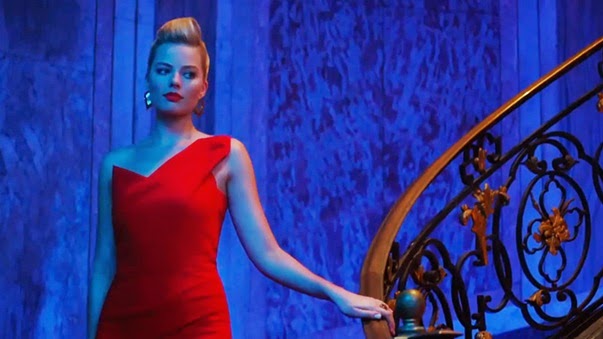A breezy, sexy, ultimately empty crime caper, Focus is a victim of its own sleight of hand. It is so intent on hoodwinking its audience and disguising its characters’ motivations that it doesn’t entertain so much as tease, constantly taunting us with one version of events before yanking out the rug again and again. It’s the kind of movie where nothing is what it seems. That does make things unpredictable, since no viewer could possibly anticipate Focus‘ sudden twists and hairpin curves. But following this movie’s labyrinthine structure becomes less a tantalizing task of puzzling things out than a tedious exercise of wait-and-see. When you’re constantly on guard for the next big surprise, nothing is truly surprising.
Here’s the good news: For its first 40 minutes or so, Focus is a blast. The ageless Will Smith stars as Nicky, an inveterate con man who decides to tutor Jess, a fledgling pickpocket played by the fast-emerging Margot Robbie (last seen heating up the screen in The Wolf of Wall Street and set to appear next summer as Jane in Warner’s Tarzan reboot). They make a pretty pair, he with his relaxed handsomeness, she with the pale blue eyes and curves that need no introduction. Their difference in years may consternate some viewers—at 46, Smith is nearly twice the age of the 24-year-old Robbie, and his goatee now betrays the slightest whispers of grey—but his charisma hasn’t waned, and it’s easy to buy the mutual attraction that quickly leads them tumbling into bed. It’s a romance that operates on surface appeal rather than real heat, which proves problematic once Focus tethers its twist-and-turn plot to the notion that Nicky, typically such a cool customer, has fallen desperately in love.
But that’s for later. At first, what really turns Nicky and Jess on is not sex but theft; for its easygoing first act, Focus is all about the art of the steal. Jess, hungering to prove her light-fingered mettle, follows Nicky from New York to New Orleans, where he and his partner, Horst (a very good Brennan Brown), lead a team of roughly 30 small-time crooks who work in magical unison. Jess proves a quick study, and before long she’s artfully bumping into marks on the street, apologizing profusely while casually pilfering their wallets, then deftly handing the goods to a passing teammate. This is not entirely plausible—it seems that, for every regular Joe in the Big Easy, there are roughly six of Nicky’s confederates operating in concert—but it’s fun to watch, and writer-directors Glenn Ficarra and John Requa (whose previous feature was the terrific Crazy Stupid Love) show off some dynamic snap in a montage of effortless, expertly coordinated larceny. But it’s all small potatoes, and at one point, Jess asks Nicky if he’s ever contemplated a long con, the kind where scrupulous planning yields a retirement-sized payday. He shoots her down flat: keep it small, sell everything, never risk.
If only he were telling the truth. The remainder of Focus involves Nicky embroiling himself in a series of absurdly improbable long cons, first featuring a million-dollar bet at the Super Bowl, then an even more outrageous scam involving Formula One drivers in Argentina. The issue here isn’t the cockamamie plot. It’s that, as the movie’s contrivances pile up and its twists beget more twists, it becomes increasingly clear that nothing on screen is what it seems. At one point, Jess confronts Nicky about his shape-shifting motives, complaining that she’ll never be able to trust him. Neither can we, but more importantly, we can’t trust Ficarra and Requa. Their favorite trick—replaying footage of past events with the benefit of new information, thereby demonstrating what was really happening the first time around—gets old in a hurry, and it only reinforces their smoke-and-mirrors approach. Eventually, Focus collapses under its own manufactured weight, like a stylish house of cards with a rotted foundation.
Not that the movie is entirely lacking in allure. Ficarra and Requa may not be great filmmakers, but unlike their point-and-shoot approach in Crazy Stupid Love, they flash some panache here, such as a strange silent sequence where a hulking anonym purchases a series of protective items, then crashes his car at high speed for reasons that swiftly become clear. They also generate one visually gasp-worthy moment—a striking shot of Robbie, clad in a clingy red dress and matching lipstick, descending a staircase bathed in blue—that appears plucked from a Michael Mann film. And Focus confirms what Wolf of Wall Street fans already suspected: Robbie is a star. I’m not sure yet whether she’s a great actress, but her screen presence is undeniable (she looks pretty good in a bikini too, in case you had doubts), and her easy chemistry with Smith hints at the kind of movie Focus could have been, had Ficarra and Requa focused on characters instead of shocks.
I’m by no means suggesting that a sharp plot twist is inherently fatal to a film’s success. The best recent capers—in particular, Steven Soderbergh’s Ocean’s Eleven and Tony Gilroy’s woefully underrated Duplicity—featured final-act reveals that carried legitimate thrills of surprise. But those movies worked because their twists derived organically from their characters and their base narratives. Yet apart from its delightful opening act, Focus doesn’t even have a base narrative; it’s all about heaping one surprise on top of another, with no underlying core to give it any meaning. You might gain casual enjoyment from this movie, with its talented, good-looking actors and exotic locations, but you will eventually grow exasperated with its sweaty desire to fool you. On that score, you can trust me, which is more than I can say about anyone or anything in Focus.
Jeremy Beck is the editor-in-chief of MovieManifesto. He watches more movies and television than he probably should.


